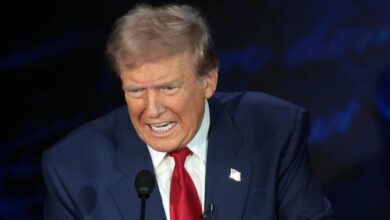South Korean President Yoon Suk Yeol to end martial law – DW – 12/03/2024

South Korean President Yoon Suk Yeol said he would lift “emergency martial law” soon after the opposition-controlled parliament voted against it.
“Just a moment ago, there was a demand from the National Assembly to lift the state of emergency, and we have withdrawn the military that was deployed for martial law operations,” Yoon said in a televised address.
“We will accept the National Assembly’s request and lift the martial law through the Cabinet meeting.”
Yoon had declared martial law in another televised address just hours earlier, in which he accused the opposition of paralyzing the government and sympathizing with North Korea. The move came into effect at 11 p.m. local time (1400 GMT/UTC).
“To safeguard a liberal South Korea from the threats posed by North Korea’s communist forces and to eliminate anti-state elements… I hereby declare emergency martial law,” Yoon said at the time.
Police were at the scene outside the National Assembly parliament in Seoul soon after Yoon’s address, and helicopters could be seen landing on the building’s roof.
The military said martial law would “remain in place until lifted by the president,” according to local media reports.
The opposition, as well as Yoon’s own party, urged him to reverse the decision.
Meanwhile, protesters gathered outside the parliament building and chanted: “Arrest Yoon Suk Yeol!”
Opposition votes to end martial law
Shortly after Yoon’s declartation of martial law, South Korea’s National Assembly passed a motion declaring it invalid. Of its 300 members, 190 were present.
Opposition staff barricaded doors to prevent troops from clearing the building before the vote could be held.
“Of the 190 present, 190 in favor, I declare that the resolution calling for the lifting of the emergency martial law has been passed,” speaker Woo Won-shik said.
Opposition leader Lee Jae-myung, who narrowly lost to Yoon in the 2022 presidential election, said the implementation of martial law was both “illegal and unconstitutional.”
Han Dong-hoon, who serves in Yoon’s administration, called the decision “wrong” and vowed to “stop it with the people.”
The US National Security Council said it was in contact with Seoul and monitoring the situation closely.
“The US was not notified in advance of this announcement. We are seriously concerned by the developments we are seeing on the ground,” the National Security Council said in a statement.
US Deputy Secretary of State Kurt Campbell also expressed “grave concern.”
Washington stations thousands of troops in South Korea to guard against its northern neighbor.
What the martial law decree stated
The document declaring martial law said it was doing so “in order to protect liberal democracy” and to “protect the safety of the people.”
It made six core points, and said violators of them were subject to search, arrest and detention without a warrant.
All political activities, from parliament to local councils to public demonstrations, were prohibited.
Any acts “that deny or attempt to overthrow the liberal democratic system are prohibited, and fake news, public opinion manipulation, and false propaganda are prohibited.”
All media and publications were subject to control of martial law command.
Strikes, work stoppages and “rallies that incite social chaos” were prohibited.
Any and all medical personnel on strike or who have left the medical field of duty should return to work.
Finally, the document stated that “innocent ordinary citizens, excluding anti-state forces and other subversive forces, will be subject to measures to minimize inconvenience in their daily lives.”
South Korea’s constitution states that the president can declare martial law during “wartime, war-like situations or other comparable national emergency states.”
Budget stuck as opposition hold parliamentary majority
The opposition Democratic Party has a majority in parliament and is therefore able to thwart Yoon’s plans for next year’s budget in South Korea.
Opposition lawmakers last week gave the go-ahead to a downsized budget plan through a parliamentary committee.
“Our National Assembly has become a haven for criminals, a den of legislative dictatorship that seeks to paralyze the judicial and administrative systems and overturn our liberal democratic order,” Yoon said.
The president accused opposition lawmakers of cutting “all key budgets essential to the nation’s core functions, such as combating drug crimes and maintaining public security… turning the country into a drug haven and a state of public safety chaos.”
Yoon: Opposition is ‘anti-state’ and wants to ‘overthrow regime’
Yoon went on to label the opposition, which holds a parliamentary majority, as “anti-state forces intent on overthrowing the regime” and described his decision to impose martial law as “inevitable.”
Meanwhile, the president has also been dismissing calls for independent investigations into scandals involving his wife and top officials, attracting stinging rebukes from his political rivals.
Tuesday’s decision from Yoon, who took office in 2022 but has seen his approval rating dip in recent months, has sent shockwaves through the country, which had a series of authoritarian leaders early in its history but has been considered democratic since the 1980s.
The news saw the Korean won drop sharply against the US dollar.
jsi, msh/zc (AP, Reuters, AFP)




